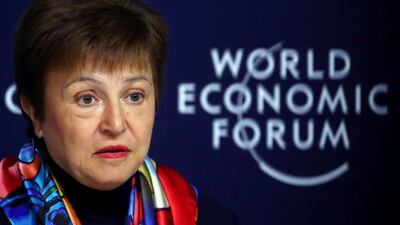Sustainability can help to fuel the global recovery from the pandemic, International Monetary Fund chief Kristalina Georgieva said on Tuesday, as long as policymakers revitalise global co-operation and "wrestle" with climate change together.
The global economy is set to grow 5.5 per cent this year, 0.3 per cent "higher than projected before," Ms Georgieva told a virtual session at the World Economic Forum, while 2020 is still "a shrinking economy", at 3.5 per cent.
“We at the Fund are absolutely categorical on climate,” she said. “It is a fundamental risk to macroeconomic and financial stability and investing in the new climate economy is the best way we can boost growth and generate more jobs.”
However, to ensure climate change and sustainability becomes a prominent part of the post-pandemic future, Ms Georgieva said 2021 will become about 'the three R’s', with the first 'R' "the race" between a mutating virus and the vaccination drive.
“What we want to see is more collaboration globally,” she said.
The second 'R' is "the resolve" of policymakers to continue to support the most vulnerable parts of the economy, such as young people, women and low-skilled workers, to ensure they get through this crisis.
“Most importantly, [we need] the resolve of businesses to take on a big transformation [so that we have] capitalism that works for everyone. For us, it is critical that we see a future that is green, and that is fair and inclusive,” Ms Georgieva said.
Her third 'R' for 2021 is "to revitalise" global co-operation.
“It was not up to par with what the world needs last year," she said. “So we want to see big missions” such as climate change become something policymakers “wrestle” with together to overtake the big crisis hanging over our heads.
One of the most positive surprises of 2020, she said, was how the pandemic helped the world revaluate what matters in life.
In the very first round of fiscal stimulus, “we did not see much attention to green (issues) and probably rightly so”, said the IMF managing director as then the issue was preventing economies "from collapse".
In November, Bank of England governor Andrew Bailey said the UK had not abandoned its commitment to climate change despite the "stark decisions" it was forced to make to tackle the Covid-19 crisis.
Mr Bailey said the regulator decided to prioritise people’s jobs, livelihoods and businesses at the start of the crisis, however, the UK now aims to build a financial system that is resilient to the risks from climate change and is supportive of a net-zero economy.
Ms Georgieva said this type of change in fiscal measures has seen much more attention paid to "integrating climate risks and more importantly, opportunities of the transition to the new climate economy",
Europe vowed on Tuesday to push nations around the world to move climate action up their political and economic agendas as it forges ahead with an ambitious green overhaul to become the world’s first continent to zero-out greenhouse gases.
“We are seeing these measures coming around the world and we want to encourage more of those," said Ms Georgieva.
"Where I am particularly positive is when people say 'there is no way back'."


